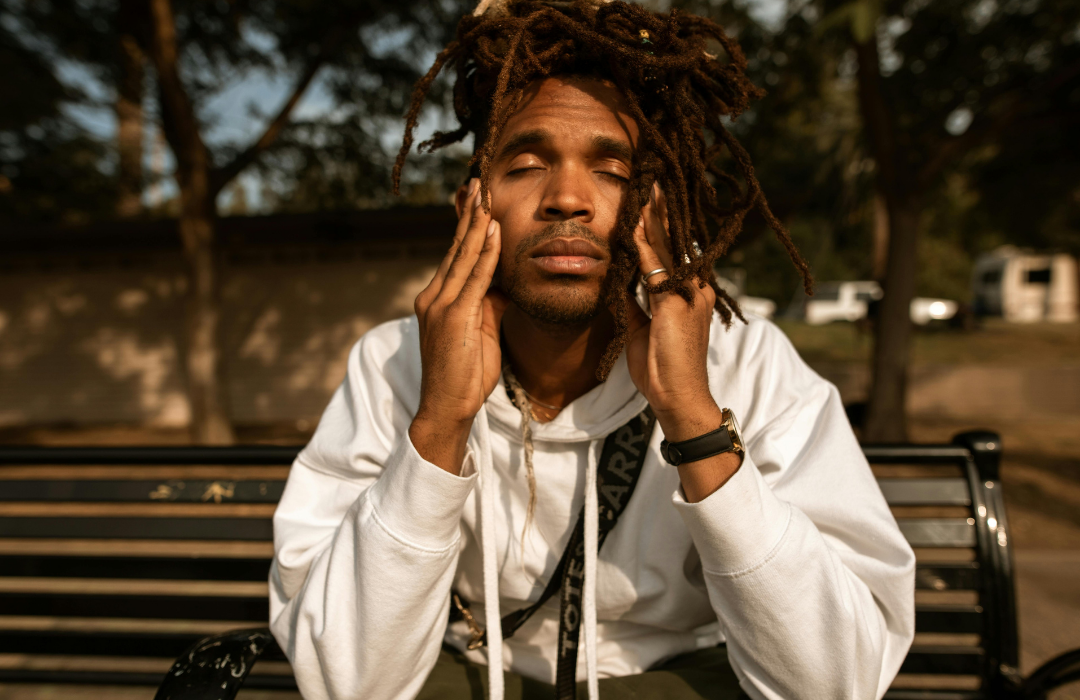
Is Your Anxiety Significantly Affecting Your Daily Functioning And Quality Of Life?
Anxiety is a natural response—characterized by feelings of unease, worry, or fear—when you feel stress or apprehension about what’s to come. It's a complex emotional state that manifests through various physical, cognitive, and behavioral symptoms.
Common Signs of Anxiety
Physical Symptoms
Persistent and unexplained bodily tension, such as muscle aches or headaches
Difficulty falling asleep or staying asleep
Increased heart rate, rapid breathing, or shortness of breath, even in non-stressful situations
Gastrointestinal issues like stomach aches, nausea, or digestive problems
Cognitive and Emotional Symptoms
Constant worry or excessive fear about everyday situations
Difficulty concentrating or experiencing racing thoughts
Irrational fears or intense feelings of dread
Heightened irritability or restlessness without a clear cause
Behavioral Changes
Avoidance of certain places, activities, or social situations due to fear or worry
Appetite changes, leading to weight loss or gain
Engaging in compulsive behaviors or rituals to find temporary relief from anxiety
While some level of anxiety can be normal, chronic stress and excessive or persistent feelings of anxiety can become frustrating. When these feelings begin to interfere with your daily life, you can benefit from working with a therapist to manage your symptoms and find lasting relief from anxiety.
The Difference Between Anxiety And Stress
Anxiety and stress are often intertwined but differ in their nature and duration.
While stress is usually a short-term response that is triggered by specific events or situations, anxiety involves a broader, persistent sense of unease or worry that tends to impact your life daily but may not have an identifiable cause. Moreover, stress can motivate you to take necessary action to address an urgent problem, while anxiety may lead to avoidance behaviors that only serve to exacerbate symptoms.
Understanding the distinction between stress and anxiety is crucial for recognizing when it’s time to seek support from a skilled therapist who can help you implement appropriate coping strategies.
Anyone Can Struggle With Anxiety
Teenagers – Today, teens are experiencing anxiety at alarming rates due to increasing academic, social, and family pressures. Working with a counselor who specializes in anxiety can help teens build their confidence, reduce their symptoms, and become more secure in themselves.
College Students – Going to college is a major life transition, and it’s common for students to experience social, academic, and financial pressures. Therapy can help college students navigate academic pressures and social challenges more effectively.
Pregnant and New Moms – New moms often experience heightened anxiety due to the demands of caring for a newborn, hormonal changes, and adjusting to new roles. In therapy, new mothers can find support for managing anxiety and navigating parenting challenges.
Working Professionals – Many working professionals struggle with job-related stressors and burnout. A therapist can offer strategies for coping with anxiety in the workplace and achieving a healthier work-life balance.
Have any questions? Send us a message!
What Causes Anxiety Disorders?
There is no single root cause of anxiety, but an individual’s family history, environment, and personal circumstances can heighten their risks. Here are a few common factors that can contribute to anxiety:
Genetics
You may be more likely to develop anxiety if you have a family history of anxiety or similar mental health conditions.
Environmental Conditioning
If your emotional needs were not met by your childhood caregivers, you might struggle to cope with stressful situations in adulthood.
Trauma
Experiencing trauma, especially childhood trauma, can cause your nervous system to overreact to situations that mimic your original triggers.
Medical Issues
Sometimes, undiagnosed physical health conditions or prescription drug interactions can mimic symptoms of anxiety.
Therapy Can Help You Find Relief From Anxiety
At Repose, we are dedicated to cultivating a foundation of trust and guiding you through the journey of self-regulation and symptom management. Our therapists are committed to helping you explore and reframe the negative thought patterns linked to anxiety, while also equipping you with practical skills to navigate overwhelming emotions and build resilience.
We place a profound emphasis on enhancing the mind-body connection, encouraging a deep understanding of how your emotional and physical responses intertwine with stress. Our extended therapy sessions provide the time and space to focus on specialized anxiety management techniques that support your holistic well-being. This approach goes beyond traditional talk therapy, integrating research-backed tools to monitor your progress and refine our methods based on what truly works for you.
At Repose, our commitment is to offer a comprehensive healing experience that honors the connection between mind, body, and spirit, supporting you every step of the way on your path to wellness.
Treatment Methods For Anxiety
At Repose, we honor the intricate connection between mind, body, and spirit, drawing from a range of evidence-based therapeutic modalities to craft a treatment plan that resonates with your unique journey. Our approach to healing anxiety is deeply rooted in holistic and somatic practices, each designed to support your overall well-being.
-
Through Cognitive Behavioral Therapy, we work together to gently reshape the thought patterns and behaviors contributing to your anxiety. By fostering awareness and cultivating more constructive thinking, CBT empowers you to navigate life with greater clarity and calm.
-
EMDR is particularly beneficial for those whose anxiety stems from trauma. This method uses bilateral stimulation to process and release the emotional charge of distressing memories, helping to soothe anxiety and restore balance to your nervous system.
-
Somatic Experiencing is a body-centered approach that helps release the physical tension and trauma stored within your body. By attuning to your body's natural rhythms, this therapy nurtures a sense of safety and ease, allowing you to move through anxiety with greater resilience.
-
AEDP is designed to transform emotional suffering by fostering a deep connection between therapist and client. Through this nurturing relationship, we explore and process difficult emotions, allowing you to experience healing at an accelerated pace. This therapy integrates mind, body, and spirit, providing a compassionate space for you to reclaim your inner strength and vitality.
-
DBT provides practical tools for managing anxiety, focusing on emotional regulation, distress tolerance, and mindfulness. This approach equips you with the skills to face challenging situations in alignment with your values.
-
(ACT) emphasizes the importance of accepting your thoughts and feelings rather than fighting against them. By cultivating psychological flexibility, ACT encourages you to live in alignment with your values, even in the presence of anxiety. This approach supports you in embracing life fully, fostering resilience and a deeper sense of purpose.
-
Through creative and embodied experiences such as art therapy, dance therapy, and yoga therapy, Experiential Therapy offers unique pathways to express emotions, reduce stress, and cultivate mindfulness. These practices invite you to explore and alleviate anxiety in ways that resonate deeply with your whole being.
-
ERP is a specialized approach for those dealing with anxiety linked to obsessive-compulsive disorder (OCD). By gradually and safely confronting the triggers of your anxiety without resorting to compulsive behaviors, ERP helps you reclaim control and find a state of calm and resilience.
-
IFS therapy offers a compassionate framework for understanding and harmonizing the different parts of yourself. By integrating conflicting internal dynamics, IFS supports healing from anxiety, fostering a sense of inner unity and peace.
-
At Repose, we recognize that true healing often extends beyond the mind and body. Our spiritual counseling services are designed to support you in exploring the deeper, existential questions that may arise during your healing journey. By integrating spiritual practices and perspectives, we create a space for you to connect with your inner wisdom, find meaning in your experiences, and cultivate a sense of peace that transcends the physical and emotional realms.
At Repose, we are committed to guiding you through your anxiety treatment with a holistic and personalized approach, ensuring that every step of your healing journey is met with care, compassion, and a deep respect for your mind, body, and spirit.
Measurement-Based Care In Anxiety Treatment
At Repose, we believe in the power of evidence-based care to guide your healing journey, particularly when addressing anxiety. Measurement-Based Care (MBC) is a cornerstone of our approach, providing a structured, data-informed pathway to track your progress and refine your treatment.
MBC allows us to closely monitor your symptoms using standardized tools like the Generalized Anxiety Disorder 7 (GAD-7) scale. This objective measurement provides a clear picture of your anxiety levels, ensuring that your treatment plan is always aligned with your current needs. As your therapy progresses, we continually adjust our strategies based on your responses, ensuring that your care remains as dynamic and personalized as you are.
Clear and consistent communication is central to our practice. By regularly sharing insights from these assessments, we empower you to understand your progress, fostering a sense of motivation and collaboration in your treatment. This transparency is not just about keeping you informed; it's about ensuring that every step we take is purposeful and effective.
With MBC, we’re able to intervene more effectively when necessary, keeping your progress on track and helping to prevent setbacks. This method also fosters a sense of accountability and engagement, both for you and your therapist, ensuring that your journey towards healing is one of partnership and proactive care.
At Repose, we're committed to providing the highest standard of care, using every tool at our disposal to support your well-being and growth.
But You May Still Have Questions About Anxiety Therapy…
-
At Repose, our therapists use evidence-based treatment approaches to address the emotional and physical symptoms of anxiety and boost your overall well-being. It can take a little time to see improvements outside of sessions, and if you like you’re not making progress, you can share this with your therapist. We can explore different techniques for your treatment plan to ensure you get the support you need.
-
Some people begin to feel better after just a couple of sessions, while others may need more time in therapy before they see a significant reduction in their symptoms. Your therapist will help you move forwards at a pace that feels comfortable for you. In the long run, we aim to support you in “graduating” from therapy rather than staying in it indefinitely by empowering you with the tools you need to manage your anxiety independently.
The memories and fears associated with PTSD typically replay over and over in a person’s mind, often causing them to display avoidance behaviors, steering clear of triggers associated with the traumatic event, as well as exhibiting increased arousal, such as being easily startled. These kinds of responses can greatly disrupt an individual’s ability to engage in normal activities and sustain stable relationships.
-
It’s normal to feel hesitant to talk about your anxiety. Our therapists are trained to build trust and create a safe, non-judgmental environment, encouraging you to share only what you’re comfortable with when you’re ready. Additionally, all information shared in therapy sessions is confidential, with a few legal exceptions such as instances of child or elder abuse, danger to self or others, or court orders. We take confidentiality very seriously to ensure you feel safe and secure in sharing your experiences.
-
Unprocessed trauma can often fuel anxiety disorders because the intense stress that arises as a result of trauma can trigger persistent feelings of fear, unease, and hypervigilance. Additionally, if you already have anxiety symptoms and experience a traumatic event, your distress and long-term symptoms can be amplified. A trauma-informed therapist can help you address trauma and anxiety simultaneously.

A Compassionate Therapist Can Help You Recover From Anxiety
At Repose, we understand that healing from anxiety requires more than just traditional talk therapy—it calls for a compassionate, culturally attuned, and holistic approach that honors the connection between mind, body, and spirit. Our somatically-oriented therapists are committed to providing a safe and supportive space where you can explore and address the roots of your anxiety.
With a deep understanding of how anxiety and chronic stress often intertwine with past trauma, our trauma-informed therapists guide you through personalized, evidence-based care that empowers you to manage and alleviate your symptoms. Whether you're seeking relief from overwhelming stress or working through the lingering effects of trauma, we're here to help you reclaim your sense of peace and well-being.
We offer in-person therapy at our offices in NYC and Pleasantville and online therapy for anxiety across New York, New Jersey, and Connecticut. This way you can access our services from the comfort of your own home. If you're ready to begin your journey toward healing, we invite you to schedule a free 15-minute consultation with one of our dedicated therapists. At Repose, we're committed to walking alongside you every step of the way as you rediscover balance and harmony in your life.
More on Anxiety from the Repose Journal
Types of Anxiety and Anxiety-Related Disorders
Anxiety can manifest in a variety of ways, and it can look different person to person. A licensed therapist who specializes in anxiety can help identify the type(s) of anxiety you’re experiencing and develop a tailored treatment plan to meet your specific needs.
Generalized Anxiety Disorder (GAD)
GAD is characterized by excessive worry and anxiety about various aspects of life, including health, work, relationships, and daily responsibilities. Individuals with GAD often struggle with persistent, uncontrollable worry that can impair daily functioning.
Social Anxiety
Social anxiety involves an intense fear of social situations and being negatively judged or scrutinized by others. Individuals with social anxiety typically experience distress in everyday social interactions, which leads to avoidance behaviors that can worsen their symptoms over time.
Panic Disorder
Panic disorder entails recurrent and unexpected panic attacks, which are sudden episodes of intense fear accompanied by physical symptoms such as rapid heart rate, sweating, trembling, and feelings of impending doom. These attacks can happen without any obvious triggers.
Specific Phobias
Specific phobias are intense, irrational fears of specific objects, situations, or activities. Common examples include fear of heights (acrophobia), flying (aviophobia), animals, blood, or enclosed spaces (claustrophobia).
Performance Anxiety
This type of anxiety manifests as intense fear or nervousness before or during public speaking, performances, or competitions, leading to physical symptoms like sweating or trembling.
Obsessive Compulsive Disorder (OCD)
OCD is defined by intrusive thoughts (obsessions) and repetitive behaviors or mental acts (compulsions) aimed at reducing anxiety or preventing perceived harm. These compulsions can significantly interfere with daily life.
Post-Traumatic Stress Disorder (PTSD)
PTSD can develop after experiencing or witnessing a traumatic event. Symptoms include flashbacks, nightmares, hypervigilance, and avoidance of reminders of the traumatic event, which persist beyond the event itself.
Perinatal or Postpartum Anxiety
Perinatal and postpartum anxiety involves intense worry, fear, or nervousness experienced by new mothers during pregnancy and up to two years after childbirth. Mothers with perinatal or postpartum anxiety might struggle with persistent, intrusive thoughts about the baby's well-being or general concerns, often accompanied by physical symptoms, which makes it difficult to function and care for their baby.
Yes! We Accept Insurance!
Many of our therapists accept Aetna, Aetna Student, and Wellfleet Student health insurances. When using these in-network insurances, you will only be required to pay the cost of your copay at the time of service.
If you want to use other insurance providers with out-of-network benefits, you are required to pay the full fee at the time of service. When using out-of-network insurance only, we provide you with a monthly superbill (a receipt of the therapy services you paid for) with all of the necessary information for you to submit the claim to your insurance.










